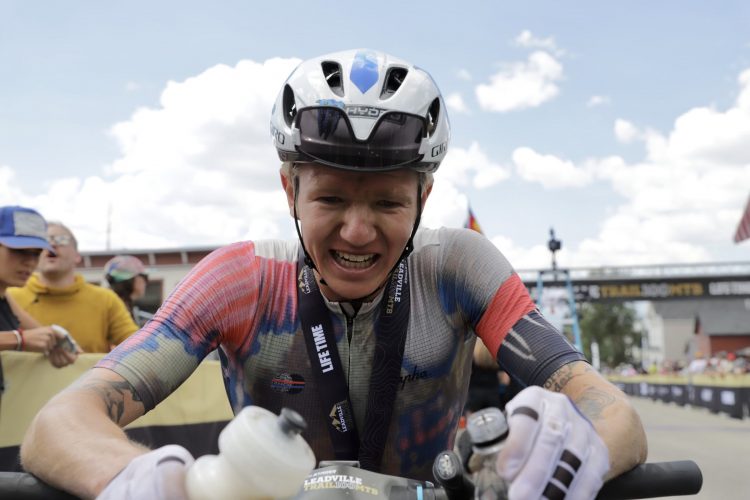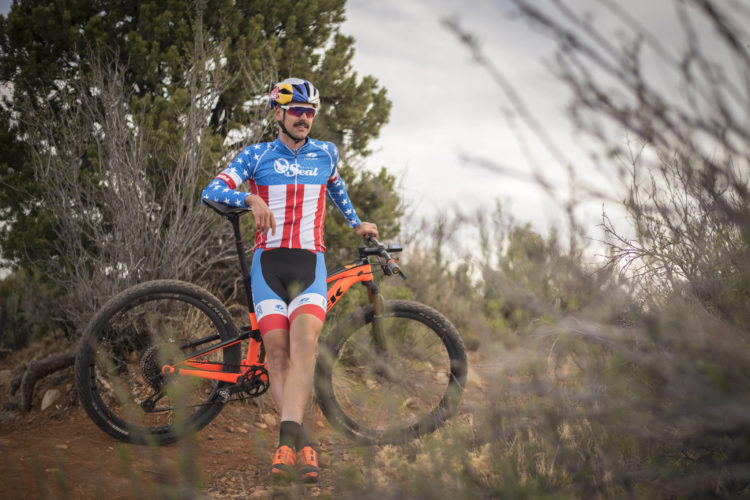
When it comes to races like the Leadville 100, the fastest riders are usually vying for the earliest start waves. Being around people who can match your pace means less time maneuvering around others if and when you need to pass, ultimately having an impact on your finish time.
For Leadville, Colorado local Ty Hall, 58, who’s started dead last at the race since 2015, that’s the point. In 2022 Hall finished 115th after passing 1,485 people on course. For each person Hall passed, $42 was donated from the LT100 Legacy Foundation, ultimately raising $63,000 for the community of Leadville. Hall’s efforts have raised almost $400,000 for the town and tomorrow he’s back at it again. Each year the money is donated to Lake County High School students who want to pursue college or is injected into the town through other ways.
Leadville roots
Aside from a brief stint at Western State College in Gunnison, Hall has called Leadville home since 1988. Growing up in a small town near the Shenandoah Valley in Virginia, he moved to Leadville for the small community feel he grew up with, just at a much higher elevation. He worked at Ski Cooper, a small ski resort in the winter and at a golf course in the summer as a handyman.
Hall met his wife who was born and raised in Leadville, and though at the time they didn’t know exactly what they wanted to do, they knew they wanted to stay.
“Leadville is either one of those places where you like it or you don’t,” he said. The winters are long, the air is thin, and the local industry work in ranching and mining is tough. The environment, atmosphere, and history has created a resilient community.
When he moved to Leadville, he remembers it was very much a depressed town, with boarded up windows and suffering from the county’s largest employer, the Climax Mine, shutting down in 1982. Leadville’s population quickly declined, businesses shut down and the town claimed the nation’s highest unemployment rate.
In 1983, local miner Ken Chlouber, along with Merilee Maupin, founded the Leadville Trail 100 Run with the intent to bring people to traverse and compete over the jagged peaks. With that distance, they’d have to buy a hotel room and spend some money in town during their stay. The bike race started 11 years later. Hall didn’t know what to think of the 100-mile race then, but in 1994 he signed up.
“Twenty something years later here we are,” he said. “After every year I swore I’d never do it again, but it just hasn’t worked out.”
Hall’s partner Roxy pursued a job as a school teacher early on, but the two also started a business together, the Tennessee Pass Nordic Center, Cookhouse, and Sleep Yurts. After 26 years, the yurts operate year-round and they employ over 30 people.
The start of the Dream Chaser
The Leadville Trail 100 Legacy Foundation started in 2002 as a 501c3 nonprofit, donating to community entities like the fire department and search and rescue and helping the community with dental and vision care. The Foundation started donating $1,000 to each high school graduate that wanted to pursue some form of higher education. Today, each student gets $2,000.
In 2015, race director at the time Josh Colley reached out to Hall and asked him if he was into a wild idea: if after racing the Leadville 100 for years and finishing with sub-eight-hour times, he’d start at the back of the race and try to pass people–for a good cause. For the first year, the Foundation partnered with TransAmerica, which donated $5 per person that the Dream Chaser passed.
“The timing was great, because I didn’t know exactly what I wanted to do with the Leadville 100 anymore,” said Hall, who’d competed more than 20 years by then and was achieving commendable finish times. “It was perfect for me, because [it was] a new approach to it and a new angle. And this really helps keep me motivated for riding and racing.”

In 2015 and 2016, Hall passed over 1,400 racers, raising over $7,000 for the Foundation through TransAmerica, and the corporation later backed out, opening donations to the public.
“Honestly, it was the best move for us, because now we can raise so much more money,” Kelsey Wood, the marketing and communications manager for the Foundation said. In 2019 and 2021 they raised over $100,000.
The Foundation is presented to participants and those attending the athlete’s meeting. Though corporations can donate, it’s mostly individuals and athletes contributing, with the average pledge at around 10 cents per person, according to Wood.
“It’s a nice way for people to get involved and feel like they’re doing something bigger than riding a bike,” said Hall.
Passing the masses
Hall wears his yellow Dream Chaser kit on race day and builds up a swift pace, passing as many people as he can on the first half of the course. He’s careful when and where he passes. He doesn’t want to ruin anyone else’s race or his own. Hall recalls riding closely off the trail one year when he snagged a branch and went sailing along with all of his food.
“It can be a challenge starting dead last, but it’s also something you have to be super mindful of and pick and choose your battles.”
He usually lines up at a few big mountain bike races every year. Training is a regular part of Hall’s routine, but he practices intervals closer to the race, since windows for passing can be sporadic and he needs all the juice he can get.
“I kind of blow myself up in the beginning and then I try to get myself back after climbing Columbine,” he said, halfway through the course.
With the Dream Chaser brief at the athlete’s meeting and the bright yellow kit, other racers are supportive, Hall said, and they’re usually cheering him on or even letting him draft
Community impact
As of today, Hall has raised nearly $400,000 for the Leadville community as the Dream Chaser. Aside from high school grads, the Foundation has awarded grants to community wheel programs, St. Vincent’s Hospital, the National Mining Hall of Fame, and even local trail builders the Cloud City Wheelers. Hall said the Foundation recently bought the organization a mini-excavator to help build local trails that he’s using to train on.
The Climax mine is operating again, though at a fraction of its force before the shutdown in the 1980s. Still, Leadville faces new challenges similar to other Colorado mountain towns like a rising cost of living and an influx of second home buyers and short term rentals, which it quickly cracked down on.
Considering his goals for 2023, Hall wants to stay safe during the race and finish every year, “but when it comes down to the numbers, I always love if we can get close to, or over, $100,000 of donations,” he said. “We’ve done that in the past, where we’ve had that in a year and it’s incredible. And on a personal level, if I could beat eight hours, I would be so excited.”
Woods, the communications manager for the Foundation said Hall would never talk about it himself, but the potential lot of money on the line puts pressure on him each year and his work can’t be valued.
“We are always super grateful for his efforts,” she said. “If you think about it, there’s a lot riding on this day for Ty and the Foundation and he carries a really big weight all day and the weeks leading up to it. He just wears it so well, but it’s a lot of pressure.”
Readers can support Ty’s efforts by donating here.





















5 Comments
Aug 24, 2023
Aug 24, 2023
Aug 24, 2023
Aug 11, 2023
Aug 11, 2023